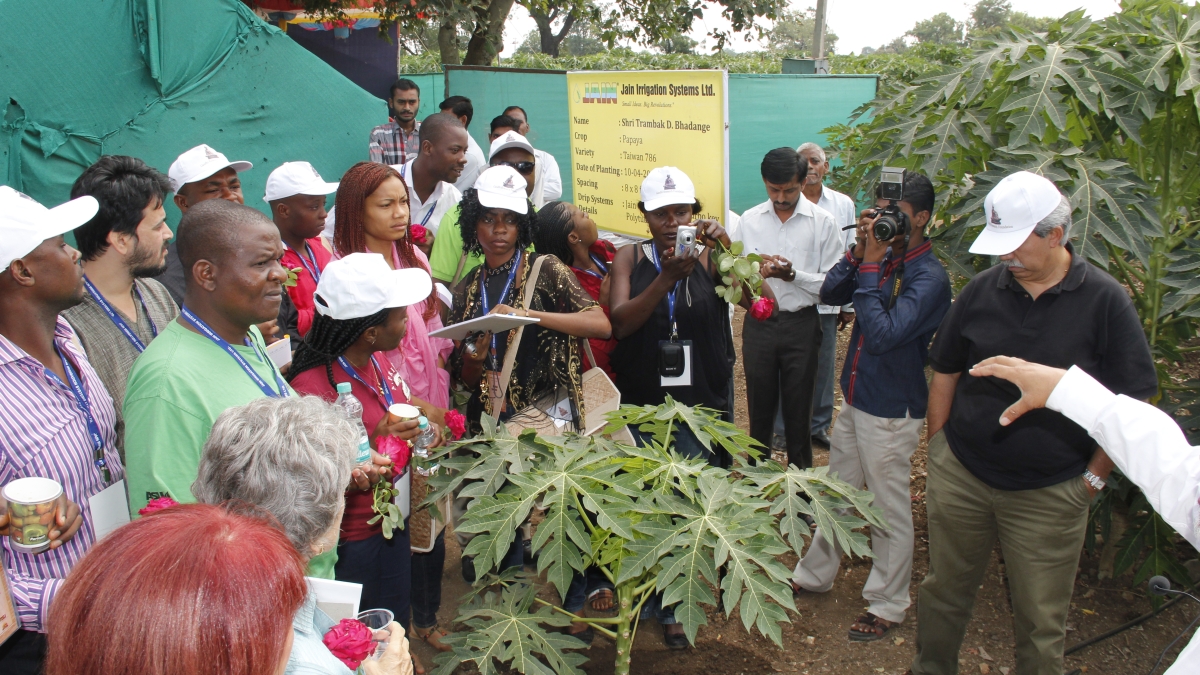Global farmers, young leaders link peace to sustainable agriculture

Food. To some of us, food is just one more thing to bother us during our busy days. However, to 870 million people on this planet, food is a constant worry and responsibility. Sometimes, it isn’t even available.
“Sustainable agriculture and food is one of the major global challenges we face,” says Rimjhim Aggarwal, a senior sustainability scientist in Arizona State University’s Global Institute of Sustainability and an associate professor in ASU’s School of Sustainability. “We face the challenge of increasing production and making sure that production reaches hungry mouths, and to do it all in an environmentally sustainable manner. How we do it is the big question.”
It is estimated that the world’s population will reach 9.5 billion by 2050. As more countries grow and construct cities, rising incomes lead to more extravagant diets, mostly including meat, which takes more crops to produce. And with the advent of biofuel technologies, the pressure increases on already-limited resources – not to mention the unknown outcomes of climate change.
According to Aggarwal, while we face the future challenge of food security, our younger generations are increasingly turning away from agriculture.
“To get our youth engaged in solving the complex problem of world hunger, we need to show them that agriculture is a place for future innovations and entrepreneurship,” Aggarwal says.
Aggarwal collaborated with fellow senior sustainability scientist Marek Wosinski to organize a youth leadership training workshop called “Empowerment for Peace through Leadership in Agribusiness and Sustainability” (EmPeace LABS) in Jalgaon, India. Taking place Oct. 19-26, the workshop will bring together young community leaders from 18 countries including India, Rwanda, Nigeria and Lebanon, where hunger strikes the hardest.
Wosinski, also a senior lecturer in ASU’s Department of Psychology, initiated a partnership between ASU, Jain Irrigation Systems, Ltd. and the Gandhi Research Foundation to conduct the workshop. Besides learning about sustainable farming methods like drip irrigation, water conservation and bio-fertilizer, workshop participants will be inspired by Gandhi’s teachings on non-violent conflict resolution.
“When people are hungry, they fight for resources,” Wosinski says, referencing the 2004 United Nations University Report, “Agriculture for Peace.” “If you want to create peace and stability in developing countries, you need to secure food.”
“Gandhi believed that peace on a sustainable basis can be built from a bottom-up approach,” Aggarwal says. “Peace has to be understood not just as absence of crime or terrorism, but as an enduring characteristic of the community. This is why we are trying to make the connection between sustainable agriculture, peace-building and community development in the workshop.”
The participants are required to create and share their idea of a sustainable agriculture project that will fit their community’s needs. The projects will be fine-tuned with collaboration from other leaders. Participants will then return to their respective home countries to share what they’ve learned given their training in funding, technology and government systems.
“We want to show that this is not completely impossible; it will take time,” Aggarwal says. “Sometimes you think a project won’t be successful, but then you meet someone who had similar difficulties and then see that yes, it is a huge task, but it has been done. And that is a tremendous source of inspiration.”
Both Wosinski and Aggarwal coordinated with various teams and students for EmPeace LABS. Brian McCollow, a former School of Sustainability student and director of ideas for his start-up InfinitySquared, is a workshop coordinator.
“Participants will learn from academic experts, business practitioners and local farmers in round-table discussions and workshops,” McCollow says. “Visits to local farms will provide experiential learning. While there will be lectures, most of the training will be hands-on.”
Fellow coordinator, Mohamed Abdalla, says the conference will provide a peer-mentorship atmosphere.
“This conference is a platform where youth from the developing world can learn from each other the important lessons beyond the immediate need for food security and that sustainable development is only achieved by respecting the natural capital of our planet,” says Abdalla, a project coordinator for Wosinski’s University-Community Partnership for Social Action Research Network (UCP-SARnet), a collaborative online network with 1,700 student, expert, community activist and faculty contributors from 75 countries.
While registration for this year’s conference is closed, university students can expect and are encouraged to participate next year.
“Sustainability is a global issue that has to be understood at a global scale,” McCollow says. “My international experiences have helped me to develop my perspective on systems thinking, engage with different cultures and understand concepts on a larger scale.”
A popular and often-quoted phrase of Gandhi’s is “be the change you wish to see in the world.” But Wosinski thinks it’s more local than that.
“Don’t try to change the world; change your community.”
And little by little, with each seed planted, more people can go to bed full and at peace.